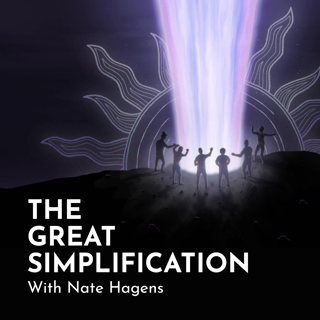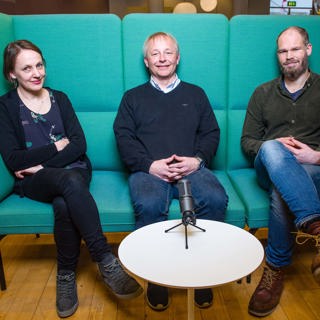
Patrick Knodel: "Question Everything - Towards Cooperation & Change”
On this episode, Nate is joined by impact investor Patrick Knodel to discuss how philanthropy and non-profit work might make positive change beyond the superficial level. The power of understanding the values and lived realities of other cultures is often overlooked but is central to finding meaningful interventions and support. Through connecting with people across the globe, Patrick has a deep sense of how to create projects that span beyond single issues, and support the autonomy of communities while preserving the land they inhabit. What does it mean to be constantly learning and questioning what you think you know - and why is it important? Is it possible to change the system from within, shifting away from growth and power paradigms perpetuated by our current institutions? How can we develop worldviews that transcend mainstream narratives and work towards true awareness of the big picture around us? About Patrick Knodel Patrick Knodel is the CEO of the knodel foundation, an impact investing firm which focuses on projects that increase sustainability and autonomy for the Global South. He also directs the investments for purpose driven and impactful startups through PANDION INNOVATION for IMPACT GmbH. Patrick has a background in economics and entrepreneurship, but his worldview and drive for non-profit projects has been shaped through his travels. Through all of his work he listens, learns, and tries to influence people with regards to issues around wealth, war, and humanity. Watch on YouTube: https://youtu.be/YU60Kn88b6c More details, and show notes: www.thegreatsimplification.com/episode/115-patrick-knodel
20 Mar 20241h 33min

Chuck Watson: "NATO in Ukraine: from Proxy to Participants”
On this special episode, risk analyst Chuck Watson returns to discuss the current state of the conflict in Ukraine and the potential for escalation. With the conflict centered around resource control, cultural clashes, and political posturing - will European countries now push to keep the United States involved with the conflict? More, are we seeing the full picture from the perspective of western media? Who is really winning this 'open secret war' and what is the context behind the various realities of the players in this conflict? Are there still peaceful, stable options that maneuver us away from open war and what would those mean for the rest of the world? About Chuck Watson Chuck Watson has had a long career in military and intelligence work, with a specialty in natural and human made disaster modeling. He worked for the US Air Force, was an attache to US Ambassadors to the Middle East Robert McFarland, and Secretary of Defense Donald Rumsfeld as a Soviet expert. Chuck has worked as an advisor to the military for over four decades with a particular emphasis on big data, open source intelligence, with an emphasis on the Soviet Union and Russia. Chuck is also the founder and Director of Research and Development of Enki Holdings, LLC, which designs computer models for phenomena ranging from tropical cyclones (hurricanes) and other weather phenomena, earthquakes, and tsunamis, as well as anthropogenic hazards such as industrial accidents, terrorism, and weapons of mass destruction. Watch on YouTube: https://youtu.be/0CeoLYQGUF0 More details, and show notes: www.thegreatsimplification.com/episode/114-chuck-watson
15 Mar 202456min

Lyn Alden: "The Myth of Frictionless Finance"
On this episode, Nate is joined by investment strategist Lyn Alden to discuss how energy and technology have shaped our monetary system and current financial trends. While more people are becoming aware of energy’s foundational role in our global systems, it is still widely overlooked, especially among those working in finance. In contrast, Lyn’s biophysically rooted analysis of macroeconomic patterns expose the cyclical dysfunction of the world’s economy. How has increasing energy availability and productivity offset the inflationary nature of fiat currencies - and what happens if this trend were to slow or reverse? What assumptions and biases have led most analysts to mis-read long term trends, leaving us with vulnerable economies? Is it possible to rejigger our systems and innovate more biophysically aligned tools to enable a smoother transition into a future with a lower energy throughput? About Lyn Alden: Lyn Alden is an independent analyst and founder of Lyn Alden Investment Strategy with a background in engineering management. Her work provides institutional-level research in plain English, so that both institutional investors and retail investors can benefit from it. Lyn also serves as an independent director on the board of Swan.com and as a general partner at the venture capital firm Ego Death Capital. She is the author of the 2023 best-selling book Broken Money about the past, present, and future of money through the lens of technology. Lyn has a bachelor’s degree in electrical engineering and a master’s degree in engineering management, with a focus on engineering economics, systems engineering, and financial modeling. She worked for over a decade as an electrical engineer at the Federal Aviation Administration’s William J. Hughes Technical Center. For Show Notes and More visit: thegreatsimplification.com/113-lyn-alden To watch this video episode on Youtube → https://youtu.be/JTbZaSL1pHI
13 Mar 20241h 40min

Peak Oil, AI, and the Straw | Frankly #56
Recorded March 5 2024 Description In this Frankly, Nate shares his perspective on the new all-time high in oil production in the context of AI’s growing influence in the financial markets and technology space. While ‘all liquids’ just hit an all time high, the varying categories of what is considered oil obfuscates a long plateau that is starting to decline. However, given AI’s expanding reach, it may not only invent ways of getting a higher percentage of Original Oil In Place to our economies, but also increase demand for energy worldwide. In similar fashion to shale fracking, MMT, and debt, AI will increasingly widen the resource extraction/ecosystem damage “straw”. Artificial intelligence is potentially a wonderful tool, but it is lower down the hierarchy than money/power maximization and thus will accelerate, not diminish climate change and other environmental damages. Can we resist the cleverness of AI and its ability to drain sources to the very last drop to instead navigate the road to the Great Simplification with wisdom? YouTube Link here For Show Notes and More: https://www.thegreatsimplification.com/frankly-original/56-peak-oil-ai-and-the-straw
8 Mar 202424min

Samantha Sweetwater: "Life at the Center”
On this episode, thought leader and ceremonial guide Samantha Sweetwater joins Nate to share her journey through mysticism and guiding others through their own unique spiritual paths. Strengthening relationality is a critical component for fostering deeper connections to nature - including fellow humans - and subsequently creating more cooperative, peaceful societies. Within a culture which predominantly values linear processes, Samantha’s work has centered around finding a balance between convergent thinking and the relational intelligence we’ve neglected. What can we learn from the various indigenous cultures who understand their entanglement with the land? Is it possible for future societies to value a more balanced development across the spiritual, mental, emotional, and physical aspects of its people? How can we - as individuals - nurture the subjective, intersubjective, and objective within ourselves to create more holistic sensemaking within a complex world? About Samantha Sweetwater: Samantha Sweetwater is a writer, soul mentor, strategic partner and deeply loved ceremonial guide. She has facilitated transformational experiences in diverse communities, cultures and industries on five continents for over 30 years. Her work bridges spirituality, science, psychedelics, indigenous wisdom, transpersonal psychology, embodiment and deep ecology. She leads experiences and conversations about our relationship with the earth, spirituality and systemic change that transform the way we think about what it means to be human. Samantha is the founder and director of One Life Circle, a plant medicine ministry tending our intimacy with and belonging to Life. She also advises companies and organizations in the areas of technology, health, materials economy and psychedelics. As the former founder of Dancing Freedom and Peacebody Japan, she pioneered the conscious dance movement—facilitating tens of thousands of people and training hundreds of facilitators to seed communities around the globe. She holds an MA in Wisdom Studies and a BA in Social Theory and the Dance with a minor in Legal Philosophy. She has been initiated by indigenous teachers in Africa, South America and the US. Her first book, True Human: Reimagining Ourselves at the End of Our World, will be available Fall Equinox 2024. For Show Notes and More visit: https://www.thegreatsimplification.com/episode/112-samantha-sweetwater To watch this video episode on YouTube: https://youtu.be/-D_y4jqxnmM
6 Mar 20241h 22min

7 Key Interventions for the Future | Frankly #55
Recorded February 26 2024 Description In this Frankly, Nate shares insights on his personal/organizational priorities as a lead up to outlining 7 global interventions that he sees as being most impactful in preparing for a resource constrained future. As global stability deteriorates and the various macro-crises converge, how we invest our time and resources now can have a big impact for the various scenarios coming our way. Can we as individuals and communities place health and wellness at the forefront of our responses - which would in turn leverage many other higher impact initiatives? What would healthy humans surrounded by community and a shared purpose, informed by the ecological systems synthesis be able to accomplish? To Watch on Youtube: https://youtu.be/Mk84BZANyWk For Show Notes and More: https://www.thegreatsimplification.com/frankly-original/55-7-key-interventions-for-the-future
1 Mar 202427min

Sandra Faber: "The Universe and Our Place in It”
On this episode, astrophysicist Sandra Faber joins Nate for a wideview cosmological conversation on the development of the known-universe and the moral implications for humanity’s role within it. We are the first generation with the ability to truly understand the history of the universe and the extreme bottlenecks that Earth and life as we know it had to endure over the last billions of years. This understanding of where we come from gives us insight into who we are - and could perhaps give purpose to those searching for meaning in the vast universe. From the Big Bang on, how did the necessary conditions come together to create the environment so many of us take for granted today? How do the laws of physics restrict everything that has ever happened in the universe - and everything that ever will? Could a deeper understanding of the cosmos shift our culture towards one that values human’s survival into deep time - and incentivize biophysically and ecologically aligned systems? About Sandra Faber Sandra Faber is an American astrophysicist known for her research on the evolution of galaxies. She is the University Professor of Astronomy and Astrophysics at the University of California, Santa Cruz, and works at the Lick Observatory. She has made discoveries linking the brightness of galaxies to the speed of stars within them and was the co-discoverer of the Faber–Jackson relation. Faber was also instrumental in designing the Keck telescopes in Hawaii. At UCSC she focuses her research on the evolution of structure in the universe and the evolution and formation of galaxies. In addition to this, she led the development of the DEIMOS instrument on the Keck telescopes to obtain spectra of cosmologically distant galaxies. On August 1, 2012 she became the Interim Director of the University of California Observatories. Watch on YouTube: https://youtu.be/04jg5--t8RQ Show notes, and more info: https://www.thegreatsimplification.com/episode/111-sandra-faber
28 Feb 20241h 26min

John Robb: "Networked Tribalism, AI, and Asteroids"
On this episode, Nate is joined by author and technology analyst John Robb to discuss how geopolitics, information warfare, and technology are shaping how we understand the world and interact with each other. With the recent rise in global tensions and violence, plus an escalating threat of catastrophic scenarios, more and more people sense that the system is unstable. Coupled with accelerating developments in artificial intelligence, we live in an environment where interpretation and sensemaking - especially at an individual level - are more difficult than ever. What do these trends and challenges mean for governments and corporations trying to control the flow of information and data? How will near-term technological advancements affect the trajectories of politics, science, and journalism - and is it possible for individuals to be aware of and mitigate their influence? During a time where communication and collective problem solving is more important than ever, will it be possible to navigate between tribes and ideological groups amidst increasing polarization and fractured information systems? About John Robb John Robb currently publishes the Global Guerrillas Report, which covers the intersection of War, Politics, and Technology. He served as a tier one special ops, after which he went on to be a popular internet analyst, entrepreneur, the COO of a software company that open sourced the current RSS standard, and much more. He also published the book Brave New War on the subject of the future of warfare. Watch on YouTube: https://youtu.be/b2n_Jk37cLE Show notes, and more info: https://www.thegreatsimplification.com/episode/110-john-robb
21 Feb 20241h 51min




















